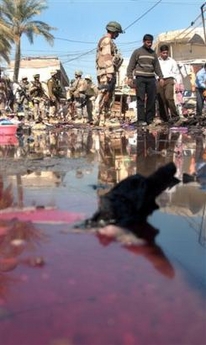|
46 bodies found in wave of Iraqi violence
(AP)
Updated: 2006-02-23 21:24
A major Sunni Arab bloc Thursday suspended talks with Shiite and Kurdish
parties on a new government after scores of Sunni mosques were attacked and
dozens of bodies found in a wave of reprisal violence following the bombing of a
revered Shiite shrine.

Iraqi soldiers inspect the scene following an
explosion in Baqouba, Iraq, Thursday, Feb. 23, 2006. A bomb exploded
Thursday in this city northeast of Baghdad, killing eight Iraqi soldiers,
the Iraqi military said. [AP] |
Violence continued Thursday with an attack on a Sunni mosque
in Baqouba, where eight Iraqi soldiers were killed in a bombing and nearly a dozen
people were wounded.
Faced with the grim prospect of sectarian war, the government extended the
curfew in Baghdad and Salaheddin province for two days in the wake of
Wednesday's attack on the Askariya shrine in Samarra. All leaves for Iraqi
soldiers and police were canceled and personnel were ordered to report to their
units.
Radical Shiite cleric Muqtada al-Sadr slammed the Iraqi government and U.S.
forces for not protecting the Samarra shrine, also known as the Golden Mosque,
and ordered his militia to defend Shiite holy sites across Iraq.
"If the government had real sovereignty, then nothing like this would have
happened," al-Sadr said a statement. "Brothers in the Mahdi Army must protect
all Shiite shrines and mosques, especially in Samarra."
At least 46 bodies were found scattered across Iraq late Wednesday and early
Thursday, many of them shot execution-style and dumped in Shiite-dominated parts
of the capital, Baghdad.
They included a prominent Al-Arabiya TV female correspondent and two other
Iraqi journalists, who had been covering Wednesday's explosion in Samarra. Their
bullet-riddled bodies were found on the outskirts of the mostly Sunni Arab city
60 miles north of Baghdad.
In mostly Shiite Basra, police said militiamen broke into a prison, hauled
out 12 inmates, including two Egyptians, two Tunisians, a Libyan, a Saudi and a
Turk, and shot them dead in reprisal for the shrine attack. They had been held
in Basra after trying to leave the country following the 2004 U.S. attack on the
insurgent stronghold of Fallujah.
The destruction of Samarra's gleaming dome of the 1,200-year-old Askariya
shrine sent crowds of angry Shiites into the streets. Many included members of
al-Sadr's Mahdi Army and other Shiite militias which the U.S. wants abolished.
The hardline Sunni clerical Association of Muslim Scholars said 168 Sunni
mosques were attacked, 10 imams killed and 15 abducted. The figures could not be
independently confirmed.
In Thursday's violence, unidentified assailants fired machine guns and threw
hand grenades at the Abu Ayoub al-Ansari mosque in Baqouba, about 35 miles
northeast of Baghdad. At least one mosque employee was killed and two others
injured, police said.
The eight Iraqi soldiers died when a bomb exploded near
their patrol in the center of the city, the army said.
|